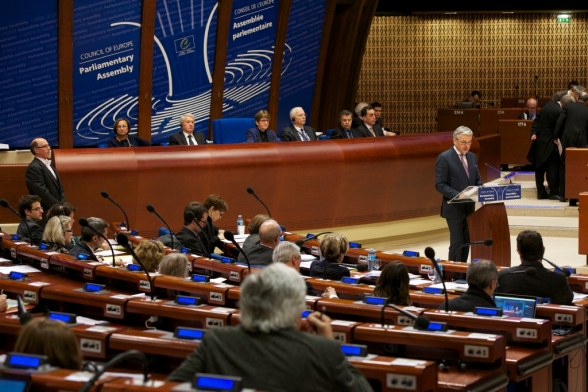While adopting the Agenda, the Assembly decided to hold an urgent debate on Wednesday 28 January 2015, titled: “Terrorist attacks in Paris: Together for a democratic response”, and to debate a challenge to the credentials of the Russian delegation to PACE late in the afternoon on the same day. The Secretary General of the Council of Europe will address the Assembly at 10 a.m. on Thursday (29 January). The debate on “Protection of media freedom in Europe” will take place on Thursday morning (29 January) while the debate on “Witness protection as an indispensable tool in the fight against organised crime and terrorism in Europe” will be held on Friday morning (30 January).
Didier Reynders, Minister for Foreign and European Affairs of Belgium and Chairperson of the Committee of Ministers of the Council of Europe, responded to the questions of members of the Assembly. The members of the PACE were informed on the reports of observers’ missions on observing the parliamentary and presidential elections in Tunisia and parliamentary elections in Moldova.
The committees of the Parliamentary Assembly of the Council of Europe were formed today, and MPs, members of Montenegrin delegation to PACE are now members of the following: Committee on Political Affairs and Democracy, Committee on Social Affairs, Health and Sustainable Development, Committee on Legal Affairs and Human Rights, Committee on Equality and Non-Discrimination, Committee on Migration, Refugees and Displaced Persons, and Committee on Culture, Science, Education and Media.
Head of Delegation of the Parliament of Montenegro to PACE participated in the meeting of PACE Bureau, while Delegation members participated in the meeting of the Socialist Group and Alliance of Liberals and Democrats for Europe.
Today PACE organised a ceremony to mark the International Day of Commemoration in memory of the victims of the Holocaust, to commemorate the liberation of the Auschwitz camp on 27 January 1945. PACE President stressed that the very word Auschwitz evoked over a million personal tragedies, but it was also a symbol, because it symbolises barbarism that is rationally organised, inhumane, and a manifestation of evil. Auschwitz represented a machine for exterminating whole population groups, and its purpose was to destroy individuals, along with their dignity, their hopes and their history. In order to avoid such atrocities the Council of Europe was created, aimed at strengthening democracy, the rule of law, and human rights.
In the morning of day two of the Winter Session of the Parliamentary Assembly of the Council of Europe there will be a debate on the election of judges to the European Court of Human Rights from Serbia and Bulgaria, as well as a debate on the status of refugees and displaced persons in Ukraine.
On the agenda of tomorrow’s sitting in the afternoon, the Assembly will consider The Report on honouring of obligations and commitments by Montenegro together with Draft Resolution, made by co-rapporteurs Kimmo Sasi and Terry Leyden, where they propose closing the monitoring procedure in respect of Montenegro and engaging in post-monitoring dialogue.
Montenegrin Delegation at the Winter session is composed of: Mr Predrag Sekulić, Head of Delegation, and members: Ms Draginja Vuksanović, Mr Goran Tuponja, Mr Damir Šehović and Ms Snežana Jonica.









